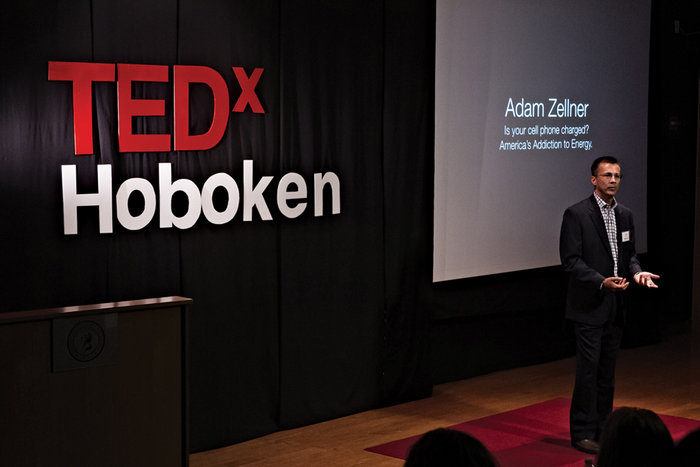Innovators, entrepreneurs, and idea generators from around the country and around Hoboken gathered at Stevens Institute of Technology’s Babbio Center on Friday, June 28 for TEDx Hoboken, an offshoot of the successful TED Conferences around the country (the acronym stands for for Technology, Entertainment and Design). The Hoboken event featured 18 speakers on topics ranging from nature to business and technology.
The theme for the event, which was organized and curated by local business owner Elizabeth Barry, was “infinite horizons,” which Barry said was inspired not only by Hoboken’s geographic location on the Hudson but also by the event’s seemingly boundless potential to spread ideas.
“As the conference ended we walked out of the Babbio Center and were literally looking at a horizon,” said Barry. “What we’re looking at is the possibility of being able to realize the manifestation of these ideas, which are one-hundred percent productive.”
Some speakers, such as Limewire software engineer and internet activist Adam Fisk, came from as far as California, while others, such as Sharon Guynup, a journalist who recently completed a book on tigers, came from just across town.
“All of this is about is people sharing their passions.” – Jeff Siegel
____________
“All of this is about people sharing their passions,” he said. “Elizabeth got us together a few weeks ago to practice, we all went around and gave our talks, and it was one of the most invigorating days of my life.”
What is TEDx?
The first TED Conference was held in 1984 and became an annual event held in Palm Springs, Calif., in 1990, aimed at highlighting “ideas worth spreading.” TED talks are limited to 18 minutes and are usually framed through storytelling. The talks became a worldwide phenomenon after the company began streaming them on its website in 2006, and have since grown to include side conferences such as TEDWomen, TEDMED, and TEDx.
TEDx conferences, which are independently organized but licensed and approved by the TED company, are aimed at creating local conversations in a local context.
“The goal is to bring communities—no matter where they’re located—together to experience and share ideas worth spreading,” said the director of TEDx, Lara Stein. “These ideas can be on an international, national, or local level, and allow people to connect and converse around them.”
Since TEDx premiered in 2009, 7,000 conferences have been held in 1,890 cities, according to the company.
The best and brightest
In preparing for TEDx Hoboken, Barry was aiming to put a program of speakers whose work was pushing the boundaries of their fields, or had moved outside their usual field to create something new.
“What a TED speaker really is is someone who has an idea that will make progress,” said Barry. “We wanted to bring in people who were involved in some sort of change, either in thought or practice.”
The talks proved to be a mix of both. Mike Michalowicz, who wrote a column on small businesses for The Wall Street Journal and has owned several businesses, gave a philosophical talk based on an experience he had with his daughter.
“Success can be a very crushing competition,” he said. “Everyone is trying to be better than anyone else, but my daughter told me one day that to be the world’s best, you just have to be your own best. We need to be embracing uniqueness, and rethinking how we define success.”
Sharon Guynup, who has lived in Hoboken for 30 years, discussed her theory that by investing in tigers, society will invest in itself, and both will flourish.
“There are only about 3,200 tigers left,” she said. “By preserving forests and wetlands, we not only will provide a habitat for these far-ranging predators, but we also can limit climate change, control flooding, prevent the erosion of soil, and provide more clean drinking water.”
C.V. Harquail, a management consultant and part-time instructor at Stevens, outlined the specific three-step process of what she calls “the boost revolution,” which involves businesses interacting on good-faith information exchanges in an effort to innovate and grow.
“It’s essentially about working out loud about what you’re doing as you’re doing it,” she said. “I think it applies nicely to the TED phenomenon.”
Some criticism
Despite its near-universal acclaim, TED has come under some criticism for its often-lavish presentations, which usually come complete with red carpets, light shows, and music. TEDx Hoboken was no different, but Fisk, one of the event’s most well-known speakers, said the decor fit the occasion.
“I think it gets slammed a bit, but what usually gets the worst of it is the inspirational aspect,” he said. “But that’s an element of the presentation that’s important for sharing ideas. You want to catch people’s eye.”
Barry agreed that the quality of the presentation is almost as important as the speakers themselves. It was for that reason that she wanted to hold the event at the Babbio Center, the campus’s newest structure, which provides stunning views of the New York City skyline.
“You literally see infinite horizons when you’re here,” she said.
Dean DeChiaro may be reached at deand@hudsonreporter.com
